|
|
|
Sort Order |
|
|
|
Items / Page
|
|
|
|
|
|
|
| Srl | Item |
| 1 |
ID:
131700
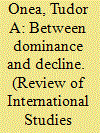

|
|
|
|
|
| Publication |
2014.
|
| Summary/Abstract |
This article investigates the role of status considerations in the response of dominant powers to the rise of emergent states. Accordingly, the hypothesis explored is that dominant actors are prone to fear that they will lose their upper rank, and, due to this status anxiety, resist the efforts of emergent powers to match or surpass them. The article begins by explaining why political actors deem status important and puts forward a theory of status anxiety in world politics. The more pronounced is this anxiety across status dimensions (economic and military capabilities as well as prestige), the higher the likelihood of conflict. This argument is then tested against competing theories of dominant power behaviour in two cases: the relations between France and Britain from the 1740s to Napoleon and those between Britain and Germany from the 1880s to World War One.
|
|
|
|
|
|
|
|
|
|
|
|
|
|
|
|
| 2 |
ID:
131697
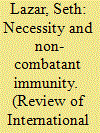

|
|
|
|
|
| Publication |
2014.
|
| Summary/Abstract |
The principle of non-combatant immunity protects non-combatants against intentional attacks in war. It is the most widely endorsed and deeply held moral constraint on the conduct of war. And yet it is difficult to justify. Recent developments in just war theory have undermined the canonical argument in its favour - Michael Walzer's, in Just and Unjust Wars. Some now deny that non-combatant immunity has principled foundations, arguing instead that it is entirely explained by a different principle: that of necessity. In war, as in ordinary life, harms to others can be justified only if they are necessary. Attacking non-combatants, the argument goes, is never necessary, so never justified. Although often repeated, this argument has never been explored in depth. In this article, I evaluate the necessity-based argument for non-combatant immunity, drawing together theoretical analysis and empirical research on anti-civilian tactics in interstate warfare, counterinsurgency, and terrorism.
|
|
|
|
|
|
|
|
|
|
|
|
|
|
|
|
| 3 |
ID:
131702
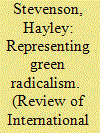

|
|
|
|
|
| Publication |
2014.
|
| Summary/Abstract |
In recent years, the post-neoliberal bloc of Latin America countries, ALBA, has fashioned a role for itself in international climate change negotiations as representing the voice of 'the people'. In this article I draw on innovative theorising of representation to critically examine this claim. I argue that although ALBA has sought to construct a constituency based on the malleable notion of 'the people', its function is better understood as 'discursive representation', and specifically as representation of Green Radical discourses. Such forms of representation are potentially important in global governance given the challenges of capturing the interests of all affected parties. I critically evaluate this case of discursive representation in terms of its rhetorical efficacy; accountability; consistency; and legitimacy. Although certain favourable elements emerge from this evaluation, this case also points to the hazards of transmitting a public discourse through a state-based representative in multilateral settings
|
|
|
|
|
|
|
|
|
|
|
|
|
|
|
|
| 4 |
ID:
131699


|
|
|
|
|
| Publication |
2014.
|
| Summary/Abstract |
Hannah Arendt's characterisation of the refugee as rightless and stateless has become a touchstone for scholars grappling with the nature of forced migration and exile. While aspects of Arendt's depiction continue to resonate, the notion of refugees as stateless, rightless 'scum of the earth' is now in many cases anachronistic, and no longer clearly reflects the challenges now faced by the majority of the world's refugees. This is attributable to structural changes in the refugee regime, particularly the increased focus on repatriation and the reconstitution of the relationship between refugees and their states of origin, a possibility largely unforeseen by Arendt. Drawing on the example of the Guatemalan repatriation movement, this article contends that indiscriminately portraying refugees as stateless represents a potential disservice to the displaced, as it may inadvertently undermine refugees' claims against their states of origin for the redress of their rights as citizens. There is a need to expand theorising on refugees from a narrow focus on the refugee as rightless and stateless to a broader conception of the refugee as a bearer of claims for the renegotiation of her relationship with her state.
|
|
|
|
|
|
|
|
|
|
|
|
|
|
|
|
| 5 |
ID:
131701


|
|
|
|
|
| Publication |
2014.
|
| Summary/Abstract |
This article addresses the problématique of the subject and the subject-object dichotomy from a post-objectivist, reflexivist perspective informed by a 'strong' version of reflexivity. It clarifies the rationale and epistemic-ontological requirements of strong reflexivity comparatively, through a discussion of autoethnography and autobiography, taken as representatives of other variants of reflexive scholarship. By deconstructing the ontological, epistemic, and reflexive statuses of the subject in the auto-ethnographic and auto-biographical variants, the article shows that the move from objectivism to post-objectivism can entail different reconfigurations of the subject-object relation, some of which can lead to subjectivism or an implicit positivist view of the subject. Strong reflexivity provides a coherent and empowering critique of objectivism because it consistently turns the ontological fact of the social situatedness of knowledge into an epistemic principle of social-scientific research, thereby providing reflexivist scholars with a critique of objectivism from within that allows them to reclaim the philosophical, social, and ethical dimensions of objectivity rather than surrender them to the dominant neopositivist tradition.
|
|
|
|
|
|
|
|
|
|
|
|
|
|
|
|
| 6 |
ID:
131698
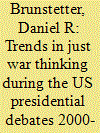

|
|
|
|
|
| Publication |
2014.
|
| Summary/Abstract |
In this article, I explore the place of the just war tradition in US foreign policy by examining the use of just war language in the presidential debates in 2000 (Bush-Gore), 2004 (Bush-Kerry), 2008 (McCain-Obama), and 2012 (Obama-Romney). While critics focus on the use and abuse of just war language as rhetorical gloss to persuade the public an upcoming conflict is morally legitimate while serving the national interest, the debates showcase just war principles as part of a language of critical engagement. Each debate cycle allowed for critical reflection on the foreign policy decisions and just war philosophy of the incumbent president. During the time period I examine, the process of critical engagement identified two moral shortcomings of the past - the failure to act to stop the genocide in Rwanda and the premature use of force in Iraq. These perceived failures catalysed convergence, across party lines, on the way some jus ad bellum principles were understood: Just cause as including the moral obligation to intervene in some way to stop genocide and the renewed salience of the principle of last resort. There remained, however, stark differences in the way legitimate authority was understood.
|
|
|
|
|
|
|
|
|
|
|
|
|
|
|
|
| 7 |
ID:
131689
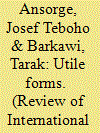

|
|
|
|
|
| Publication |
2014.
|
| Summary/Abstract |
This article introduces the concept of 'utile forms' and analyses the effects of these forms in imperial rule and contemporary counterinsurgency. Utile forms are media that enable bureaucracies to disseminate specialised knowledges to officials operating in the field. Examples include smart cards, field manuals, and handheld biometric devices. We argue that utile forms have significant social and political effects irrespective of the 'truth value' of the knowledge they contain. We analyse these effects in terms of world-ordering and world-making properties: utile forms both embody a particular worldview or ideology (world-ordering) and they facilitate official attempts to remake the world in accordance with this vision (world-making). We draw on examples of utile forms from British India and more recent conflicts in Iraq and Afghanistan. The article concludes by reflecting on the relations between truth, knowledge, and power in times of war and imperialism.
|
|
|
|
|
|
|
|
|
|
|
|
|
|
|
|
| 8 |
ID:
131694


|
|
|
|
|
| Publication |
2014.
|
| Summary/Abstract |
'Naming and shaming' those accused of abuse and misconduct is one of the most common strategies of transnational activists. Yet both qualitative and quantitative studies show that the policy and behavioural effects of naming and shaming are often contradictory. Named and shamed actors do respond at least partially by adjusting their policies and behaviour to some extent, but the actions challenged publicly as human rights violations may not cease and can even become more widespread. This ambivalent outcome is usually explained by the uneven capacity of the target to reform or by its 'strategic' response to escape the consequences of naming and shaming. By contrast, I show that naming and shaming can be brought to a standstill when the frame used by transnational activists is ambiguous. I trace the role of framing ambiguity during the Human Rights Watch (HRW) 'naming and shaming' campaigns against the Israel Defence Force (IDF) in the course of the July-August 2006 Israel-Hezbollah war (Lebanon war), and the December 2008-January 2009 Israel-Hamas war (Gaza war). I argue that HRW's use of International Humanitarian Law (IHL) as a frame led to an argumentative deadlock (frame implication contest). This legal frame, and the process of legal framing, did genuinely constrain the IDF, affecting its operations and behaviour. However, the ambiguity of the frame also provided the IDF with a range of material and ideational assets that gave it scope to claim that its actions were actually in conformity with applicable law, and to justify continuing to use force in densely populated areas.
|
|
|
|
|
|
|
|
|
|
|
|
|
|
|
|
|
|
|
|
|